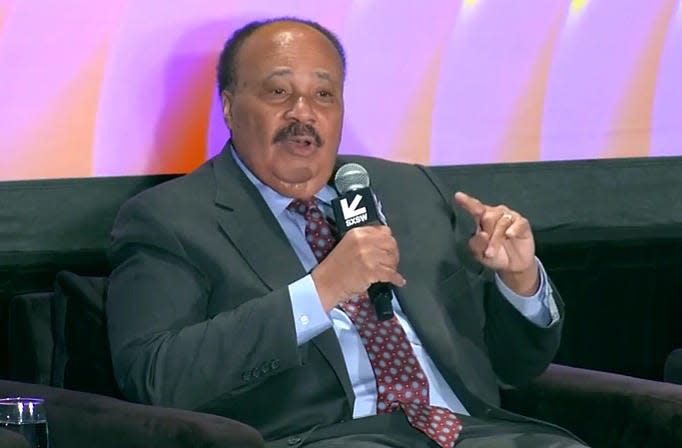Martin Luther King III, civil rights leaders remind SXSW to 'stay engaged' in voting
- Oops!Something went wrong.Please try again later.
- Oops!Something went wrong.Please try again later.
- Oops!Something went wrong.Please try again later.
Empowering people and making it easier for them to vote were just two of the ideas that Martin Luther King III, the son of slain civil rights leader Martin Luther King Jr., shared during a South by Southwest panel on voting access issues Monday.
King was joined at the panel by his wife, Arndrea Waters King, who is the president of the social justice nonprofit Drum Major Institute, civil rights leader Ralph G. Neas and Jocelyn Benson, Michigan's secretary of state.
The panel at the Austin Convention Center came as the Texas Legislature is meeting just a few blocks away at the Capitol to decide the future of Texas on a variety of policies, including gun control, education and voting rights.
In the past three years, 19 states, including Texas, have passed 34 different laws that restrict voting rights.
In September 2021, Gov. Greg Abbott signed into law Senate Bill 1, which bans drive-thru voting or casting a ballot from inside a vehicle unless participating in curbside voting due to sickness or a disability. It also prohibits 24-hour and overnight voting by requiring polls to be open a minimum of nine hours between 6 a.m. and 10 p.m.
In a time when the country continues to take steps backward in civil liberties and voting rights, said Monday's panelists, leaders should be making it easier for everyone to participate in the democratic process.
“More people voted than ever before in 2020, and that was because it was easy getting the materials do so,” Martin Luther King III said. “And we should be about making it easier for anyone and everyone to participate (in voting). That’s what will truly make our country great."
More:Early voting has begun in Texas. Here’s what to know about voting rights in 2022.

One idea was lowering the voting age nationwide. Residents must be 18 to cast a ballot, and the panelists said that expanding that opportunity to 16- and 17-year-olds would give them a chance to educate themselves and participate in the decisions that will affect them.
Benson said that, while the voting age is still 18, Michigan has implemented a program that preregisters teenagers to vote when they are getting a driver’s license or state ID, many at age 16 or 17. She said the state also allows registration up to Election Day, so late registrants are able to vote right away.
“You have to meet people where they are,” Benson said. “It’s about reducing barriers for young people who are going to inherit this democracy in the decades to come. And it's about how you ensure you are building a democracy for tomorrow.”
King also suggested allowing voting by cellphone, which he said could be especially popular among younger voters.
Neas said simplifying vote-by-mail rules could be helpful for people with disabilities who also sometimes face additional challenges, including polling place locations and lack of transportation.
“Two-thirds of polling places have impediments that make it more difficult for people with disabilities to vote,” Neas said. “Mail-in ballots could (make it easier) for them.”
Waters King added that mail-in ballots also play a role in helping young voters, often college students, participate in elections, especially if they don’t have access to a polling location on campus — a problem some voters saw at Texas college campuses in November 2020.
More:Central Texas counties report 'higher than ever' rejection rates for primary mail ballots
"We need to evaluate all these things, and the real point is to continue to have engagement," King said. "The major goal ought to be getting everybody in our country participating. That makes our democracy better."
Stay engaged to move democracy forward
The overarching message was about engagement among all voters to ensure everyone’s voice is heard. King reiterated how important young voters are, saying they will inherit the democracy being decided on today.
“Democracy thrives when people stand up and demand that it does," Benson said. “When people stand and ensure all voices are heard, we see changes that include a more inclusive democracy.”
King shared similar sentiments, saying it is time to “lead again, take organization, mobilize and vote,” and to not just vote, but vote for people who can create the change you want to see.
“We have to elect people who have the compassion and heart to want to make us a much better nation,” King said. “I know we can do it. It’s not going to happen overnight. This is not a sprint; it's a marathon. ... We are involved in marathon activities, but they will create changes.”
Of Texas specifically, he said, people have to be engaged if they want to see movement.
"The state of Texas has some major problems that we are not talking about," King said. "Because Texas is in a transition, people have to be engaged if we want to move. The question is: Do we want to move backward or forward? I always hope we are looking forward."
This article originally appeared on Austin American-Statesman: Martin Luther King III discusses expanding voting access at SXSW

